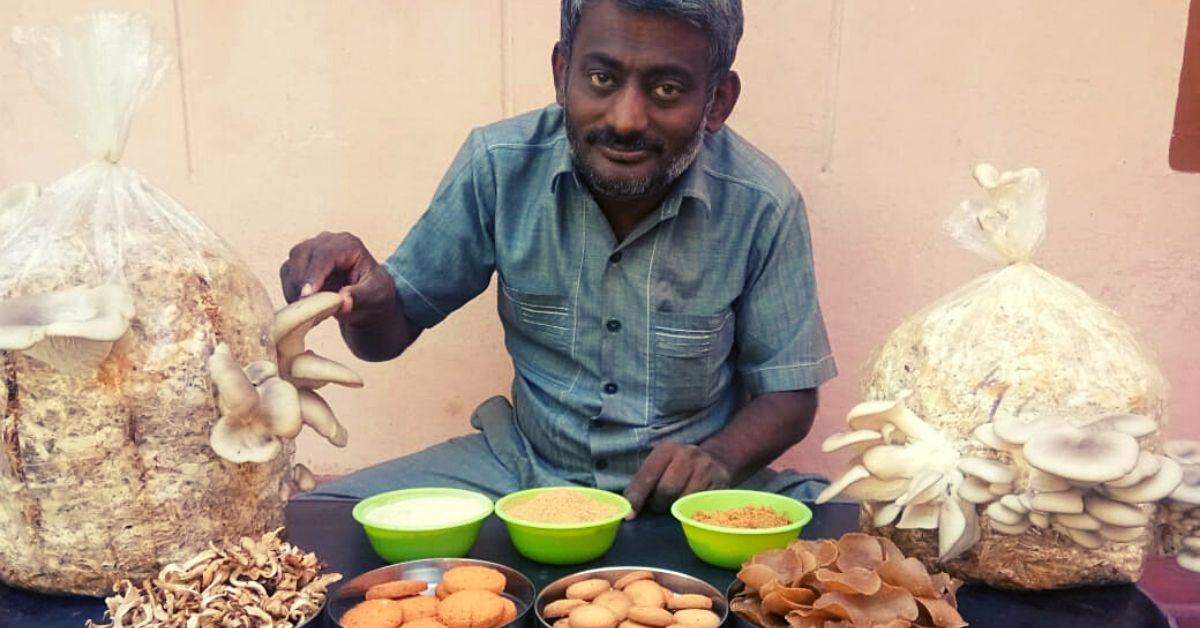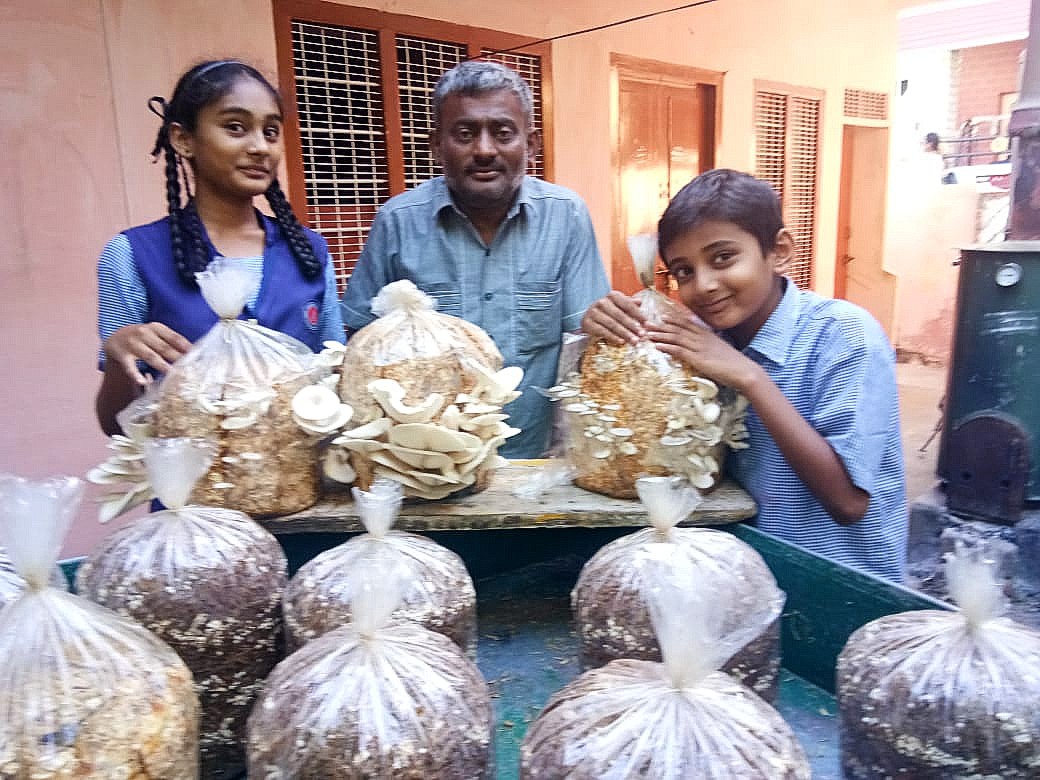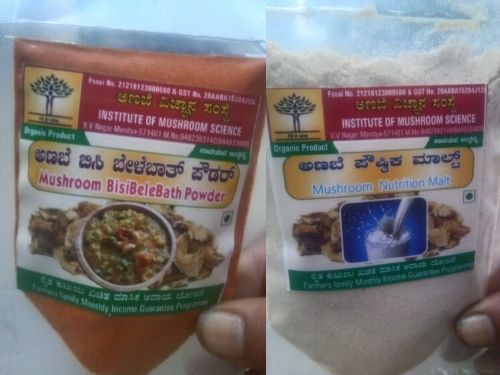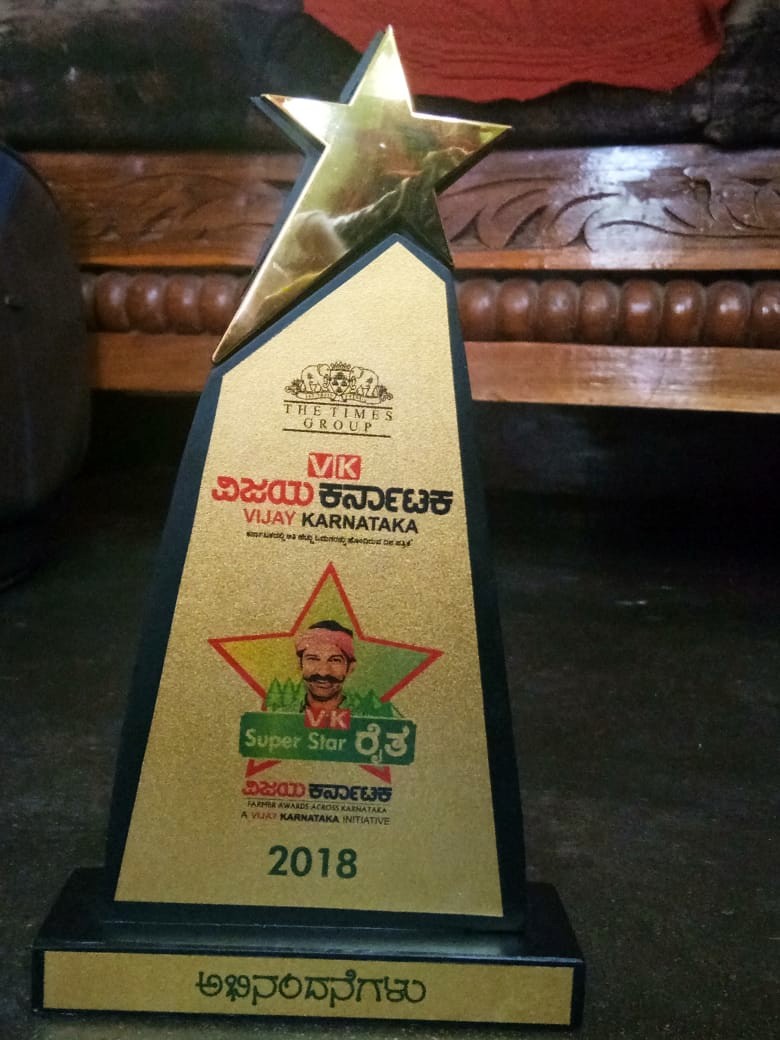Disabled Man Quits Job To Turn Mushroom Farmer, Earns Profit & Awards
Diagnosed with polio at the age of two, Mandya’s Ramakrishna J has helped 300 other farmers get started with this low-cost business!

In 2013, J Ramakrishna, a resident of Mandya, Karnataka, quit his job as a computer operator in the Primary Education Department of Karnataka, and decided to become a farmer. However, he wanted to do something different, so he decided to begin cultivating mushrooms.
“In Mandya, everyone is a farmer but not many cultivated mushrooms at that time. I got interested in them after reading several articles which suggested that has medicinal properties that can prevent iron deficiency and cardiovascular disease,” begins Ramakrishna, who was diagnosed with polio at the age of 2.
So, he started an oyster mushroom farming unit in his home after reading about their high nutritional value. In the following months, he learned the various techniques involved in mushroom cultivation, and also approached other growers who lived in the same village to mentor him.

During these discussions, he identified two major issues he could face while cultivating the edible fungi:
- The ‘Mycelium’, a fungus-like bacteria that grows into a mushroom, could catch a disease within the first 10-days, which means the mushroom would not grow. To prevent the spread of the disease, 100 yards around this one fungus would have to be cleared.
- Once the mushroom was harvested, it had to be sold within 10 hours.
“After several months of experimenting, I mastered the harvesting system. Using my personal savings as the investment, I started to put together machinery for a humidifier, to maintain room temperature. I also mastered the method of cultivating fungus in bags to ensure it did not catch any disease in the first 10-days. After this, it needs to be watered in regular intervals, for one week. Secondly, to ensure no mushroom goes to waste, I experimented with dried mushroom powder to make a variety of by-products,” says Ramakrishna.

He managed to successfully produce 20 by-products from dried mushroom powder such as papads, biscuits, rasam powder, and many others. These products are sold all over Karnataka at HOPCOMS stores, supermarkets, and other organic stores. The products have been approved by the Food Safety and Standards Authority of India (FSSAI) and Labor Welfare department.
In addition to growing oyster mushrooms and marketing the aforementioned products, he runs an organisation named ‘Institute of Mushroom Science’ which was established in 2013 to educate farmers who wanted to pursue its cultivation. It is also a production centre for ready-to-grow mushroom kits, that guarantee farmers a minimum income of Rs 3000 per month, and other by-products.
Guaranteeing a Steady Monthly Income Via Mushrooms
Ramakrishna wanted to create awareness on this vegetable’s nutritional, and financial value, so he decided to share the technique of growing oyster mushrooms in bags, with others. To this end, he proposed a ‘monthly income scheme’ for the farmers, which has been approved by the State Rural Livelihood Mission (Sanjeevani). Under this scheme, farmers can purchase ready-to-grow mushroom bags, at a low-cost. The bags have mycelium fungi which have crossed the 10-day threshold.
More than 300 farmers from Mandya, Tumakuru, Mysore and other districts in Karnataka began mushroom cultivation under the guidance of his organisation.
“With the profits I made from my mushroom business, along with the help of village panchayats, I managed to set up my mushroom farming unit in Mysuru, Tumkur, and many other districts. From there, mushroom bags are supplied to farmers who are willing to nurture it. They can earn a profit of Rs.3000 by selling the harvest from 10 mushroom bags. It is sold directly to local markets, shops, and hotels. The produce which they cannot sell, will be bought back at a specified price and I use that to make mushroom byproducts,” says Ramakrishna.
In 2017, Ramakrishna was honored by the Karnataka Skill Development Corporation (KSDC). To support his initiative they offered him a van to move around the state and promote this method of mushroom cultivation. In 2018, Vijay Karnataka newspaper named him ‘Superstar Farmer’, and gave him an award.

Ramakrishna recalls, “In 2019, there were more than 300 farmers who were cultivating mushrooms using the ready-to-grow bags. But, the nationwide lockdown imposed in March 2020 brought all my activities to a halt.”
Now, he has resumed work and he will start supplying mushroom-kits to farmers in the coming weeks.
“The by-products such as biscuits and papads, will also be available in stores from the next two weeks. I will also be selling it on BigBasket and other e-commerce platforms,” says Ramakrishna, adding that his mission is to extend his mushroom cultivation technique to more than 5,000 farmers in Karnataka.
(Edited by Gayatri Mishra)
Like this story? Or have something to share?
Write to us: [email protected]
Connect with us on Facebook and Twitter.
This story made me
- 97
- 121
- 89
- 167
Tell Us More
We bring stories straight from the heart of India, to inspire millions and create a wave of impact. Our positive movement is growing bigger everyday, and we would love for you to join it.
Please contribute whatever you can, every little penny helps our team in bringing you more stories that support dreams and spread hope.



















